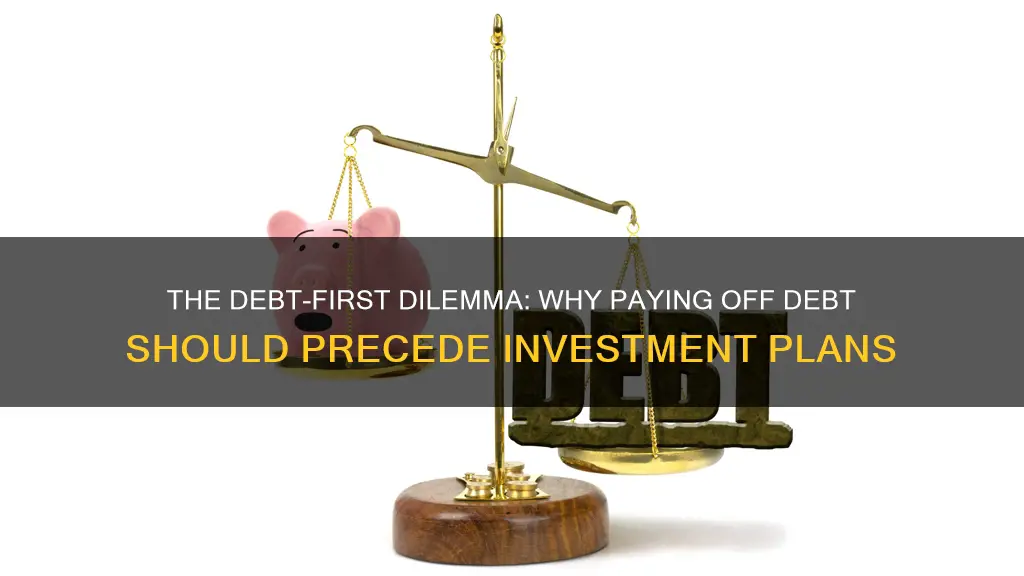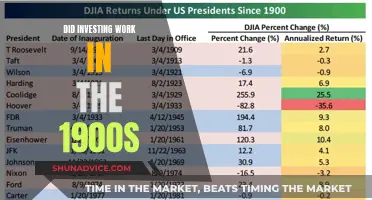
Why You Should Pay Down Your Debt First Before Investing
It is generally recommended that you pay down high-interest debt before investing. This is because high-interest debt, such as credit card debt, can accumulate quickly and be challenging to pay off. By tackling it first, you can save money on interest and free up cash for emergencies or investing. Additionally, paying off debt can improve your credit score, which is crucial if you want to borrow money in the future. However, it's important to note that investing early has its advantages, such as compounding interest, and certain debts, like student loans and mortgages, offer tax incentives. Therefore, it's essential to consider your financial situation, risk tolerance, and goals when deciding whether to pay off debt or invest.
| Characteristics | Values |
|---|---|
| Interest rate on debt | If the interest rate on your debt is 6% or more, it is generally recommended to pay down debt before investing. |
| Type of debt | High-interest debt, such as credit card debt, should be prioritised. |
| Credit score | Paying off debt can improve your credit score, making it easier to borrow money in the future. |
| Risk tolerance | If you have a low risk tolerance, paying off debt may be a better option as it guarantees a return. |
| Retirement timeline | It is generally recommended to avoid bringing debt into retirement, so this should be considered when deciding whether to pay off debt or invest. |
| Emergency fund | It is recommended to have an emergency fund before investing to avoid taking on more debt in the case of unexpected expenses. |
| Company retirement plan matches | Taking advantage of company retirement plan matches is important, as it provides a high rate of return and reduces taxable income. |
| Tax benefits | Some types of interest, such as student loan and mortgage interest, are tax-deductible. |
What You'll Learn

You'll save more money in the long run
The longer you have debt, the more interest you'll pay on it. The longer you invest, the more time your money has to grow. If you're paying high interest on your debt, it's likely to be costing you more than what you'd earn by investing. So, it makes sense to clear that debt first.
Let's say you have a credit card balance of $10,000 at 17% interest. If you pay $500 a month, you'll clear the debt in two years and pay around $1,842 in interest. If you only pay $250 a month, it'll take five years and you'll pay $4,862 in interest. That's nearly $3,000 extra for taking twice as long.
Now, let's say you have a mortgage with a 5% interest rate. If you invest in a stock market index fund returning 10% a year, you'll come out ahead by investing your extra cash there.
Credit card debt often has higher interest rates than the returns you'd get from investing. So, it's usually best to pay off credit card debt before investing.
However, it's not always that simple. Investments can be volatile. That index fund might be up 10% one year and down 10% the next. Plus, there's the psychological factor: your risk tolerance. If you're comfortable riding the market's ups and downs, you may be more suited to investing than someone who would worry about daily market fluctuations.
If you're unsure, it's worth remembering that paying off debt is a guaranteed return on investment. When you pay off debt, you're essentially earning a return equal to the interest you avoid paying. This is often a more attractive option than the risky, uncertain returns of investing.
What Your Peers are Investing In
You may want to see also

You'll have more money to invest once your debt is paid off
Once you've paid off your debt, you'll have more money to invest. This is because you'll no longer be paying interest on your debt, which can be very costly over time. By eliminating debt, you'll free up cash that can be added to your emergency fund or kickstart your investing plan.
For example, let's say you have a credit card balance of $10,000 at 17% interest. If you pay $500 a month, you'll clear the debt in 24 months and pay approximately $1,842 in interest charges. However, if you cut your monthly payment to $250, it will take you 60 months to get rid of your balance and you'll pay $4,862 in interest. That's a difference of $3,020, which could be invested instead.
Additionally, paying off debt can improve your credit score, which is important if you want to buy a home or finance a vehicle. Lenders will also look at your credit score when deciding whether to lend to you and at what interest rate. A high credit score can lead to lower interest rates, which means you'll pay less over the life of the loan.
Furthermore, paying off debt can give you peace of mind and reduce stress. Debt can be a burden, and the sooner you get rid of it, the sooner you'll feel the weight lifted from your shoulders. This can be especially important if you're losing sleep over your debts, as it's not worth sacrificing your mental health for potential investment returns.
Finally, by paying off debt first, you can take advantage of the benefits of compounding interest when you do start investing. Compounding interest is the interest earned on your interest, and it can help your money grow without any extra effort on your part. The sooner you start investing, the more time compounding interest has to work its magic.
In summary, paying off debt first can lead to having more money to invest by reducing interest costs, improving your credit score, and freeing up cash flow. It can also provide mental and emotional benefits and allow you to take advantage of compounding interest when you start investing.
REITs: A Smart Real Estate Investment?
You may want to see also

You'll improve your credit score
When it comes to financial priorities, paying off debt before investing is generally wise. This is especially true when considering the potential impact on your credit score. Here's how focusing on debt repayment first can improve your creditworthiness:
Your credit score is a critical factor in your financial life, and it plays a significant role in accessing loans, renting an apartment, or even securing a job. A strong credit score can open doors to better interest rates and terms when you borrow money. One of the most influential factors in calculating your credit score is your credit utilization ratio. This ratio compares the amount of credit you're currently using (your current debt) to the total credit available to you (your credit limits). The lower your credit utilization ratio, the better. By paying down your debt first, you can significantly improve this ratio. For example, let's say you have a credit card with a $5,000 limit, and you've accumulated a balance of $3,000. Your credit utilization ratio for that card is 60% ($3,000 divided by $5,000). If you focus on investing instead of paying down this debt, your ratio remains high. However, if you make it a priority to pay off that debt, your ratio drops, significantly improving your credit score.
The general recommendation is to keep your credit utilization ratio below 30%, and ideally below 10%, to demonstrate responsible credit management. Lenders view a low utilization ratio as a positive sign because it indicates that you are not heavily reliant on credit and are more likely to repay your debts. This can lead to easier approvals for loans and lines of credit, as well as more favorable terms. Paying down debt demonstrates responsible behavior, which is a key factor in credit scoring models. When lenders review your credit report, they want to see evidence that you can manage credit effectively. Making regular, on-time payments toward debt reduction shows that you are reliable and capable of honoring your financial commitments. This positive payment history accounts for a substantial portion of your credit score. By focusing on debt repayment first, you build a strong track record of responsible financial behavior, which improves your creditworthiness in the eyes of lenders.
Additionally, paying off debt can help lengthen your credit history, which is another factor considered in credit scoring. The longer your history of responsible credit usage, the more data lenders have to assess your reliability. This includes making on-time payments and managing different types of credit accounts, such as credit cards, mortgages, or personal loans. When you make it a priority to pay down your debt, you not only improve your credit utilization ratio and build a positive payment history but also establish a longer credit history, further enhancing your credit score. In summary, paying down your debt first improves your credit score by optimizing your credit utilization ratio, building a positive payment history, and lengthening your credit history. These factors work together to demonstrate your financial responsibility and creditworthiness, making it easier to access loans, qualify for better interest rates, and secure various financial opportunities in the future.
Food Startups: Invest in Your People
You may want to see also

You'll have peace of mind
Paying off debt can bring peace of mind and allow you to focus on other financial, personal, and family goals. Debt can be a significant source of stress and anxiety, which can negatively impact all aspects of life.
If you are losing sleep over your debts, then you may want to prioritise paying them off, even if you could get a better return on your money by investing. The weight of debt can keep you awake at night, and the peace of mind that comes with being debt-free is invaluable.
Additionally, if you are more risk-averse, you may want to prioritise paying off debt over investing. Investing in the stock market can be volatile, and if you are uncomfortable with the idea of your investments rising and falling with the market, then paying off debt may be a better option for you.
Paying off debt can also improve your credit score, which can have wider-ranging benefits than you might think. A good credit score can help you secure lower interest rates and more loan options, as well as making it easier to find housing and even affect your employability.
Finally, paying off debt can increase your cash flow, giving you more money to put towards other financial goals, such as investing, adding to your emergency fund, or saving for retirement. It can also help you limit the amount of credit card debt you accumulate in the future, as you will be less reliant on credit cards to cover your everyday needs.
Beanie Babies: A Collectible Craze
You may want to see also

You'll be in a better position to borrow money in the future
Paying off your debt first can improve your credit score, which will put you in a better position to borrow money in the future. A low credit score can make it difficult to borrow money, and even if you can get a loan, you may have to pay higher interest rates. Your credit score can also affect other areas of your life, such as insurance premiums, renting an apartment, and even employment prospects.
Your credit score is influenced by your credit utilisation ratio, which is the amount of credit you are currently using compared to your total credit limit. For example, if you have a credit card with a $1,000 limit and you've spent $500, your credit utilisation ratio is 50%. Lenders view a high credit utilisation ratio as risky because it indicates that you are heavily reliant on credit. A good credit utilisation ratio is below 50%, but ideally, it should be around 30% or lower.
By paying off your debt, you can improve your credit utilisation ratio and, consequently, your credit score. This will put you in a more favourable position when applying for loans in the future, as lenders will perceive you as a lower-risk borrower. As a result, you may be able to secure better interest rates and increase your chances of loan approval.
Additionally, paying off debt can free up your cash flow, enabling you to allocate more funds towards future investments or savings. This improved financial flexibility can further enhance your ability to borrow money and pursue other financial opportunities.
Coins to Invest in Now
You may want to see also
Frequently asked questions
The interest on your debt is likely to be higher than the return on your investments, so you will save more money by paying off your debt first.
If your debt interest rate is 6% or higher, you should prioritise paying it off.
Focus on paying off the debt with the highest interest rate first, then move on to the next-highest, and so on.
You could consider investing it, but make sure you have an emergency fund in place first.
Yes, reducing debt can improve your credit score, which is important if you want to buy a home or finance a vehicle. It can also give you peace of mind and help you sleep better at night!







